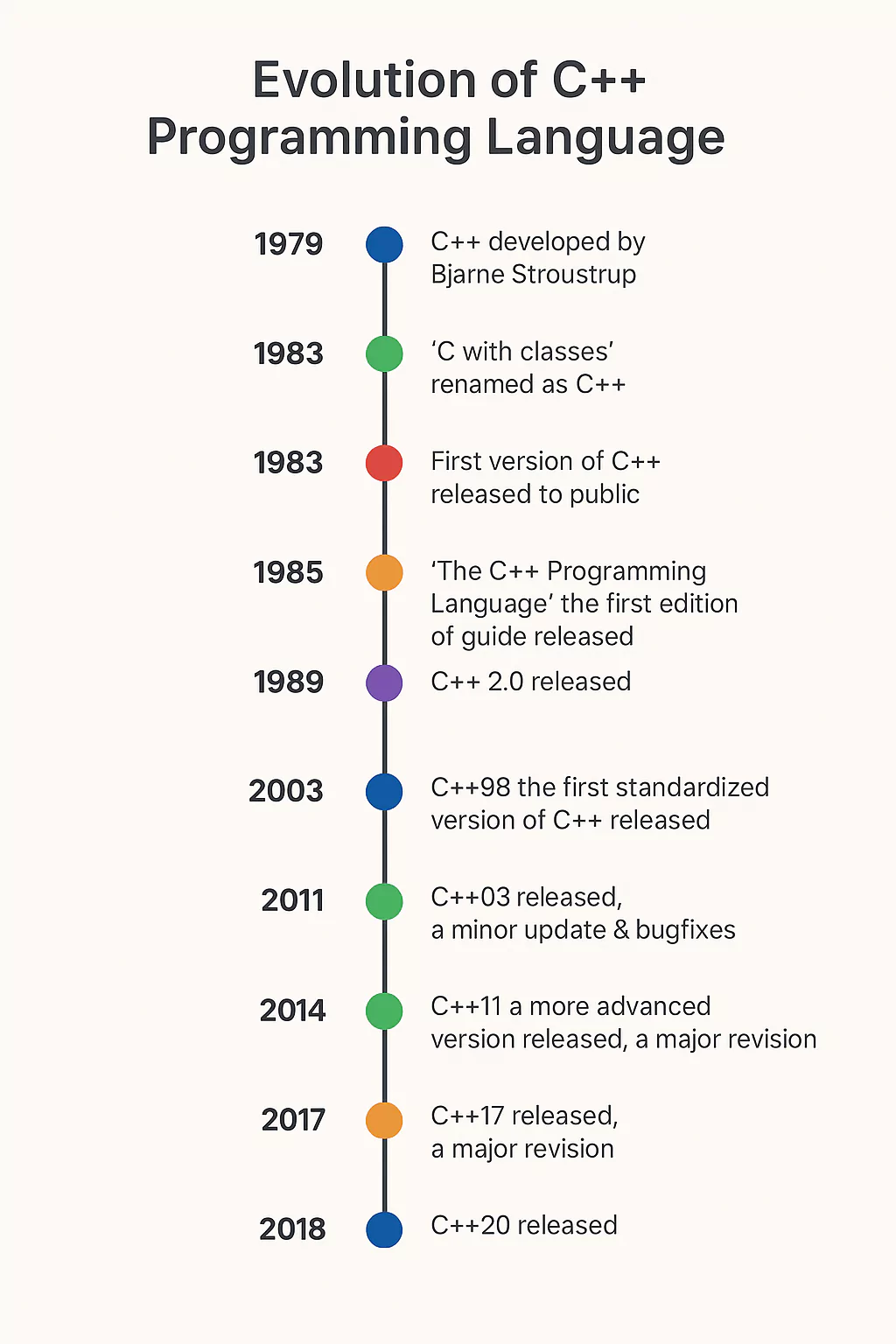The history of C++ programming language is a much wider and evolving journey filled with feature upgrades and more. If you are a programmer and want to know the evolution of this programming language then tracking its version upgrade and feature expansion can be very helpful. This programming language has been very popular among developers worldwide for a long long time.
If you are not familiar with the rich history of this popular programming language then let us help you with it. In this blog, we will learn about History of C++ programming in detail covering every aspect, upgrades, and more.
About C++ Programming Language
C++ is a strong mid level general purpose programming language with rich features and support along with object oriented programming language support. This programming language was developed by Bjarne Stroustrup in the early 1980s. This programming language was designed to provide both low level memory and high level memory abstractions.

This dual support makes it suitable for real time simulations and high performance applications. One of the major strengths of C++ programming language is the support of the Object Oriented Programming language which includes encapsulation, inheritance, polymorphism, and more. It helps in handling complex and lengthy software projects easily. But do you know the history of C++ programming language and when Object Oriented Programming was added in it.
C++ supports manual memory management which is good for developers being a powerful feature for creating feature rich applications and used in applications such as gaming engines, operating systems, embedded systems, financial systems and large scale applications. Let us know more about the history of C++ programming to get more familiar with this rich programming language.
A Brief Overview History of C++ Programming
As the time passed C++ programming language became one of the most widely used programming languages around the world becoming one of the favorite choices for both beginners as well as experienced developers as well as Let us get a pinch of brief introduction about the C++ programming and its history below.
- C++ is a mid level, general purpose object oriented programming language.
- C++ was developed by Bjarne Stroustrup in the early 1980s with its first version released in 1985.
- The C++ language is an extension of the C language, created in 1972 by Dennis Ritchie.
- C programming language does not provide support for Object Oriented Programming Language.
- The object oriented programming programming (OOPs) feature was added in the update released in 1985.
- C++ is a compiled language which means the source code is translated into machine code before getting executed.
- C++ Programming works best for system programming, operating system, real time simulations, game development, and more.
- This programming language addressed memory leaks and pointer error concerns in its C++11 updates and above.
The Popularity & History of C++ Programming Language
C++ language being the extension of C language is a widely used programming language with third most usage by developers worldwide. The latest C++ 11 version provided users with a simple, safer, and easy to handle environment which makes it more popular among users even for learning purposes. Checking the history of C++ programming it has always been popular among developers worldwide.

Many major system softwares are written using the C++ language and companies are still using it to upgrade and maintain the systems. You can easily compile and run your code on multiple platforms which makes it effective and highly accessible. C++ programming language consists of an extensive community with tools, libraries and support. As per the TIOBE index, C++ is the 3rd best programming language in the world.
The Timeline History of C++ Programming Language
Check the complete timeline of the history of C++ programming language with key milestones over the years.

1. 1979 – C++ Developed by Bjarne Stroustrup
Bjarne Stroustrup started working on “C with Classes” at Bell Labs, aiming to extend the functionality and features of C language with object-oriented features such as classes and basic inheritance. This initiative completely aimed to combine the performance of C with modern programming concepts, making software development more organized and scalable.
2. 1983 – Renamed as C++
The language was officially renamed from “C with Classes” to C++, a name that signifies an increment of C, using the ++ (double) plus operator from the C language. This renaming of C language also marked the formal beginning of C++ as a distinct language with its own identity.
3. 1983 – First Public Release of C++
The first version of C++ was made available to the public this year. It introduced many key features like classes, basic inheritance, inlining, default function arguments, and strong type checking, laying the foundation for object-oriented programming in C++ language.
4. 1985 – First Edition of The C++ Programming Language
Bjarne Stroustrup published the first edition of The C++ Programming Language, a complete comprehensive guide to the language. This book played a crucial role in popularizing C++ among developers and served as the authoritative source on how to use the language.
5. 1989 – C++ 2.0 Released
This version added multiple inheritance, abstract classes, static member functions, constant member functions, and protected members. C++ 2.0 marked a significant leap in object-oriented capabilities and language maturity.
![]() Join Our Full Stack Development Telegram Channel
Join Our Full Stack Development Telegram Channel
![]() Join OurFull Stack Development WhatsApp Channel
Join OurFull Stack Development WhatsApp Channel
6. 1998 – C++98: First Standardized Version
The ISO/IEC standardized version of C++ was released, which came to be known as C++98. It included several templates, STL (Standard Template Library), exceptions, namespaces, and new casts. This version brought uniformity and stability to the language, encouraging broader industry adoption.
7. 2003 – C++03 Released (Minor Update)
C++03 was primarily a bug-fix version or release for C++98. It offered improved compiler support and fixed ambiguities in the standard, but did not add any major features. It ensured that the standard was more user friendly.
8. 2009 – C++0X Draft Released
Before the next major update, a draft known as C++0X was circulated. It proposed several modern features in C++ programming like auto keyword, lambda expressions, nullptr, and move semantics. It helped shape the future direction of C++.
9. 2011 – C++11 Released (Major Revision)
C++11 was a groundbreaking revision that modernized the complete programming language. It introduced smart pointers, auto keyword, range-based for loops, lambda expressions, move semantics, threading support, and uniform initialization. It made C++ more expressive and efficient for modern development needs.
10. 2014 – C++14 Released (Minor Improvements)
C++14 built on C++11 with minor but helpful improvements like binary literals, generic lambdas, return type deduction, and bug fixes. It aimed to refine the features introduced in C++11 and make them more usable.
11. 2017 – C++17 Released (Major Update)
C++17 introduced significant changes, such as structured bindings, if constexpr, inline variables, filesystem library, and performance enhancements. It focused on better compile-time evaluation and cleaner code.
12. 2018 – C++20 Released
C++20 brought major new features including concepts, ranges, coroutines, modules, and calendar/date libraries. It is considered one of the most substantial updates, making the language more powerful, expressive, and efficient for modern software architecture.
13. 2026 – C++ 23 Released
This version was published by ISO in October 2025 is a standard update which follows the C++20 version with new features like simplified syntax, improved capabilities, more powerful lambdas, and more.
Features of C++ Programming Language
Let us get familiar with some of the best features of C++ programming language.
- C++ is a primary mid level general purpose language used frequently in competitive programming, building complex software applications, and more.
- This programming language provides an extensive library support i,e. STL (Standard Template Library) with predefined methods for frequent processes used in programming.
- C++ provides support for object oriented programming with crucial processes like inheritance, polymorphism, encapsulation, and more.
- Being a compiled language which means that the code is first converted into machine level lange using a compiler for faster execution.
- The compiled code of C++ programming is platform independent and hence you need not to write specific code for each platform.
- C++ provides multiple inheritance which is not available in all other programming languages.
Complete History of C++ Programming Language In Table
Let us understand the complete history of C++ programming language with the table given below.
| Version | Release Date | Major Changes |
| C++98 | October 1998 | The very first standardized version of C++. It laid the foundation for the language as we know it today. |
| C++03 | February 2003 | A minor update to C++98, mainly fixing bugs and clarifying some rules. It also added value initialization to make default values safer and clearer. |
| C++11 | August 2011 | A huge update! Introduced modern features like lambda functions, auto keyword, nullptr, range-based for loops, rvalue references, and move semantics making C++ faster, cleaner, and more expressive. |
| C++14 | August 2014 | Here the complete polished what C++11 started. Brought in generic lambdas, digit separators (like 1’000’000), and simpler syntax for common tasks. Mostly a quality-of-life update. |
| C++17 | December 2017 | This version added smart features like structured bindings, if/switch with initializers, and inline variables. Also improved compile-time capabilities and performance tweaks. |
| C++20 | March 2020 | A major leap! Brought in concepts (for better template programming), ranges, coroutines (for async programming), modules, and reflection-like capabilities. Truly modern C++. |
| C++23 | January 2025 | This phase made complete focus on further enhancements. Adds small but useful features, better support for reflection, and minor tweaks to make C++ even smoother and more consistent. |
Also Read:
- Command Pattern | C++ Design Patterns
- CPP Type & C++ Data Types: For Beginners
- Understanding the C++ Array: An Effective 11 Step Guide
- The Effective Guide on Encapsulation in C++ with a Real-Life Example
Master C++ Programming With PW Skills
If you are interested in learning C++ programming language and making a shining career this year, join our Decode DSA With C++ Course and become job ready skills. This course is suitable for everyone including beginners as well as experienced developers who want to switch to C++ programming. Learn about the complete evolution and history of C++ programming language.
Get real world projects based on C++ programming along with practice exercises, doubt support, pre-recorded lectures, and more. Get industry based certification after completing this course and become job ready with your industry based job profile.
History of C++ Programming Language FAQs
Q1. When was C++ first launched?
Ans: C++ was first made available with first edition in 1985 with an official name of C programming language with a double plus operator in the name.
Q2. Who Developed C++ programming language?
Ans: The C++ programming language was Bjarne Stroustrup in the early 1980s at Bell Laboratories. The C++ was designed as an extension with object oriented support in the language.
Q3. Can we track the history of C++ language?
Ans: Yes we can easily track the timeline and development of C++ programming language. Read the complete blog to know more about the history of c++ language.
Q4. What is the latest version of C++ language?
Ans: C++ 23 is the latest version of the C++ programming language which resembles many features from the 20th version along with some added features.
Q5. What is the first version of C++ language?
Ans: The C++ language was first launched in February 1985 developed at Bell Labs by Bjarne Stroustrup.


